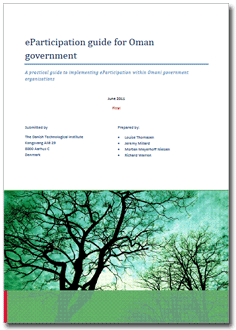DTI eParticipation guide for Oman - 2011 June
Published 07-06-2013
As part of a consultant team from the Danish Technological Institute (DTI) Louise Thomasen and colleagues Jeremy Millard, Morten Meyerhoff Nielsen and Richard Warren wrote an eParticipation guide for Oman.

Download
 DTI eParticipation guide for Oman - 2011 June.PDF (2.5mb)
DTI eParticipation guide for Oman - 2011 June.PDF (2.5mb)
Abstract
His Majesty Sultan Qaboos has given directives concerning the development of direct communications channels between citizens and government bodies. Such communication channels may be physical meetings, but they must also be supported by the online efforts of Omani government.
eGovernment is not just about putting government services online and improving their delivery. Rather, it is also a set of technology-mediated processes that can improve the overall quality of policy and decision making and change the broader interactions between citizens and government.
Governments everywhere are struggling to improve the quality of engagement and decision making, whilst widening the involvement of all citizens. Governments are also under pressure to do more with less. Most are working hard to deliver effective policies and services at least cost to the public purse; many are trying to leverage resources outside the public sector. Last but not least, governments are seeking to ensure and maintain high levels of public trust, without which government actions will, at best, be ineffective and, at worst, counterproductive. At the same time, more educated, well-informed and less deferential citizens are judging their governments in terms of their policy and service delivery performance.
This guide explains the principals of eParticipation, the commitment and requirements for successful implementation and some of the tools that can be used.
With the spread of social media globally, people are connecting with each other electronically and in new ways. For governments this means both opportunities and threats. Some of the tools for eParticipation are government controlled and owned, some are not. The essence is that government can offer eParticipation through government owned means, but will also have to follow the users (citizens, businesses, visitors etc.) and be where they are. Government needs to join in, monitor and contribute within any relevant on-line communities, in order to reap the full benefits.
The guide is made available for download here with the permission of ITA.


